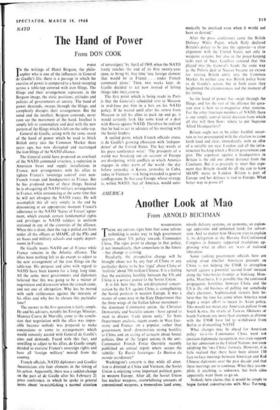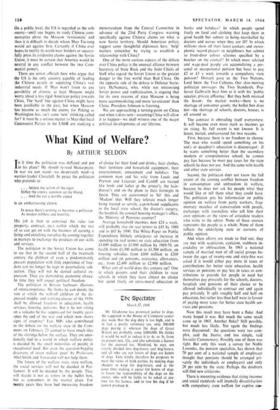AMERICA
Another Look at Mao
From ARNOLD BEICHMAN
WASHINGTON
THERE are curious signs here that some serious rethinking is under way in high government quarters about US policy towards Communist China. The signs point to change in that policy, if not immediately, then somewhere in the future —but change is coming.
Peculiarly, the prospective change will be brought about not by any fear of China or any particular desire to be less 'rigid' about China or 'realistic' about 700 million Chinese. It is a feeling that the escalating hostility between the US and China is a service gratuit to the Soviet Union.
It is felt here that the uni-directional concen- tration by the US against China is strengthening the Soviet position in western Europe. It was a matter of some note in the State Department that the three wings of the Italian labour movement— the dominant Communist union. the Christian Democratic and Socialist unions—have agreed to meet to discuss 'trade union unity.' To State Department analysis, recent events in West Ger- many and France—on a popular, rather than government, level—demonstrate strong hostility to China and an easing of ccncern about Soviet policies. One of the largest unions in the anti- Communist French Force Ouvriere recently published an annual report where occurs the subtitle: 'Le Russie Sovietique: Le Bastion du monde occidentale!'
Washington's concern is that while all atten- tion is directed at China and Vietnam, the Soviet Union is enjoying some important political gains in western Europe. After all, the Soviet Union has nuclear weapons, overwhelming amounts of conventional weapons, a tremendous land army, missile delivery systems, an economy, an espion- age apparatus and unlimited funds for subver- sion. And no matter how Moscow tries to explain it, its delegation at the Havana Tri-Continental Congress in January supported resolutions ap- proving what in effect are 'wars of national liberation:
Some ranking government oflicials here are asking aloud whether American pressure on China is not helping the USSR to strengthen herself against a potential 'second front' menace along the Sino-Soviet frontier at Sinkiang. Mon- golia. Manchuria. It is possible that the continued propaganda hostilities between China and the US is the old business of pulling out somebody else's chestnuts. Sophisticated viewers here be- lieve that the time has come when America must begin a major effort to recast its Asian policy. This would not mean any American pullout from South Korea, the straits of Taiwan. Okinawa or South Vietnam any more than attempts at détente with the USSR have led to withdrawal from Berlin or dismantling NATO.
What changes may be ahead for American policy vis-a-vis Communist China need not envision diplomatic recognition, nor even support for her admission to the United Nations, nor even. adopting the 'two Chiba' formula. However, it is little realised that there have been almost 130 face-to-face meetings between American and Red Chinese diplomats over the past decade and that these meetings are to continue. What they accom- plish, if anything, is unknown, but both sides apparently want them to go on.
Nobody here claims that it would be simple to beget formal conversations with Mao Tse-tung.
On a public level, the US is regarded as the sole enemy—until one begins to study Chinese com- mentaries about the Moscow 'revisionists' and then it is difficult to decide whom Mao Tse-tung would act against first. Certainly if China ever hopes to rectify its north-west borders or success- fully press its irridentist claims against the Soviet Union, it must be certain that America would be neutral in any conflict between the two Com- munist powers.
There are senior officials here who argue that the US is the only country capable of feeding the Chinese people or supplying China's vast industrial needs. If Mao won't listen to any possibility of detente, at least Moscow might worry about a less rigid American policy towards China. The 'hard' line against China might have been justifiable in the past, but when Moscow has become as much the enemy for Peking as Washington has, isn't some 'new' thinking called for? It must be a serious matter to Mao that local Communist Parties in the USSR are studying a
memorandum from the Central Committee in advance of the 23rd Party Congress warning specifically against Chinese claims on what is now Soviet territory. Should American policy, suggest some thoughtful diplomats here, 'help' matters somewhat by trying to establish a relationship with China?
One of the more curious aspects of the debate over China policy is the unusual alliance between Secretary of State Rusk and the Joint Chiefs of Staff who regard the Soviet Union as the greater danger to the free world than Red China. On the opposite side of the debate is Defence Secre- tary McNamara, who, while not minimising Soviet power and sophistication, is arguing that for its own reasons of state Moscow is being more accommodating and more 'co-existent' than China. President Johnson is listening.
We are approaching a turning-point on China and when it does turn—assuming China will allow it to happen—we shall witness one of the major political developments of our lifetime.



































 Previous page
Previous page